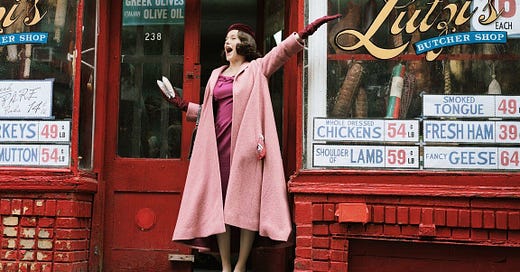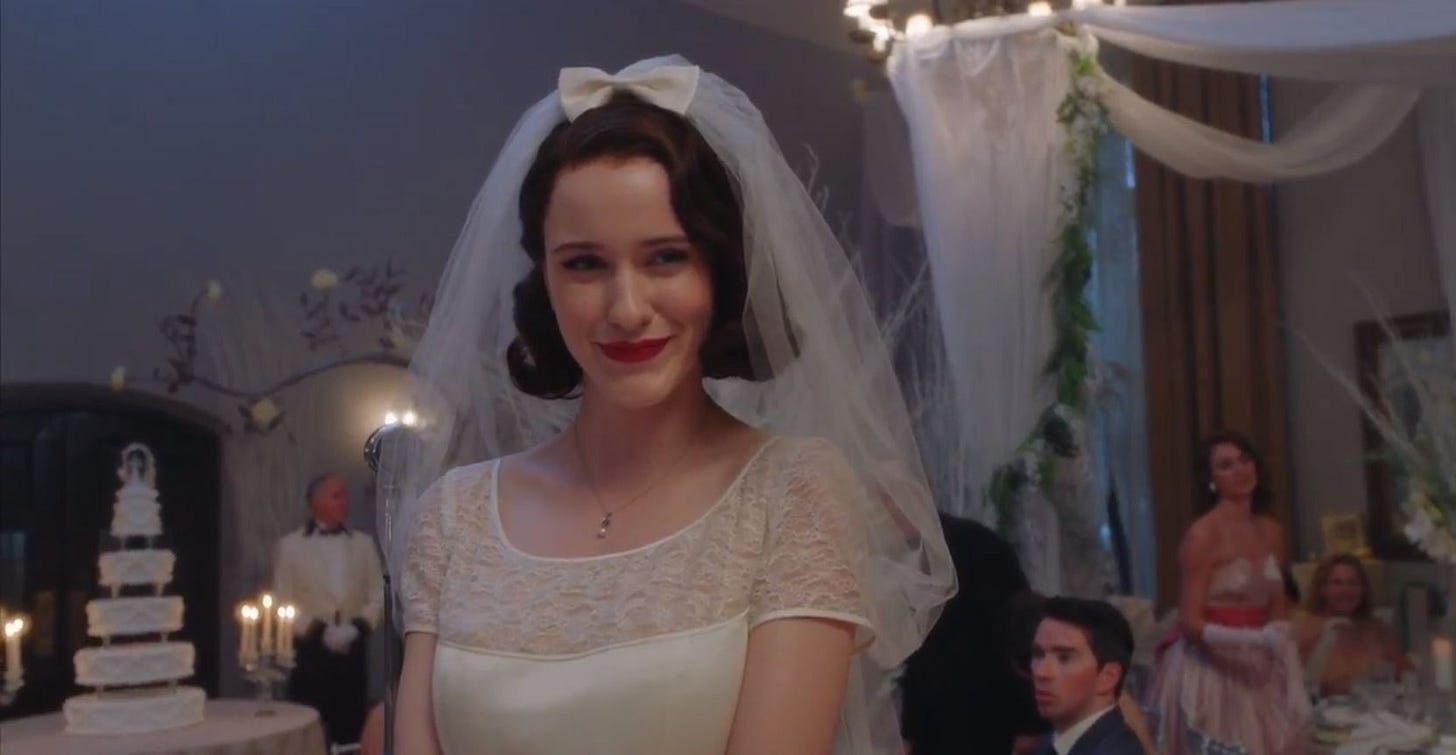The pilot episode that made us all fall in love with 'The Marvelous Mrs. Maisel'
It's just as good as I remembered.
I recently rewatched the pilot episode of “The Marvelous Mrs. Maisel.” By recently, I mean the morning before Yom Kippur, the Jewish Day of Atonement, when we fast and ask for redemption for all our sins. It is, after all, a time to reexamine things, and I wanted to reexamine whether “Maisel,” which premiered in 2017 and aired its last episode a year and a half ago, is as good and as Jewish as I remembered (spoiler alert: the answer is a resounding yes).
It’s been almost seven years since the tale of a 1950s New York housewife turned comedian first landed and became a streaming sensation on Amazon Prime, but watching it now, it feels just as groundbreaking as it did back then. Every minute of the Sherman-Palladino show is dense with that lightning-speed dialogue we know from “Gilmore Girls,” as well as meticulous attention to historical detail, impossibly witty lines, and so, so much meaning — so much Jewish meaning, to boot.
It’s hard not to see this episode itself as a Yom Kippur episode in the deeper meaning of that concept: an episode about the process of atoning, of Miriam “Midge” Maisel being made, in a way, to atone to herself. When we first meet Midge, she’s worked her whole life to be a wife, a mother, married to someone who was the “perfect man.”
“Joel Maisel was my knight in shining armor” she says, untraditionally making a toast at her own wedding, and we get the feeling that being on the stage in the center of attention is where she shines most (she ends with the superbly specific Jewish joke of “there’s shrimp in the egg rolls!”). She’s funny and quick-witted, and we see the parts of why she fell in love with Joel that she doesn’t share with her audience — how he took her to a comedy show at a seedy club, where she saw Lenny Bruce perform for the first time.
We also see Midge as someone who plans her life meticulously, like knowing she wanted to be a Russian literature major and going to Bryn Mawr. But part of that planning means completely planning to erase herself for her man, for his dreams and for his successes. She wakes up before him to put a full face on. She makes sure her body measures perfectly. She makes brisket to get him that perfect spot at open mic night at the Gaslight so he can share his mediocre stand-up. She workshops his lines for him on the cab ride home. When he still criticizes her every move and faults his bombing at the club on her, she takes it lying down. She’ll do better next time.
And so when Joel leaves her after a particularly bad stand-up performance that he blames on her, packing up his clothes in a suitcase that belongs to Midge and sharing that he’s been cheating on her with his secretary, Midge is left by herself with all the pent-up energy that she uses every day to make herself her husband’s stage whisperer that has nowhere to go now. And that’s when she winds up at that same club, finally letting herself be the one on stage, unleashing her talent, that gift that she’s been keeping under tight wraps like so many women of her generation, with her hair wet, wearing a nightgown, nakedly (literally at a certain point) herself.
The Jewish jokes and moments in this episode show such a profound understanding of Jewish community, faith and culture in this time period. The Barbra Streisand song that plays in the background. The joy of “getting the rabbi” for a High Holiday meal. The jokes about the rules of kashrut. Midge quipping, “Nobody’s happy, it’s Yom Kippur.” Midge saying the rabbi was “in Buchenwald, give him a bone,” when Joel complains that he gets more laughs at synagogue than him at the club.
And Midge herself breaks all the stereotypes of Jewish women: she’s funny, beautiful, even glamorous on stage as she jokes, “All that shit they say about Jewish girls in the bedroom — not true. There are French whores standing around the Marais saying, ‘Did you hear what Midge did to Joel’s balls the other night?’”
The Jewish authenticity in the show is so deeply felt because it is an ode to a Jewish parent who, like Midge, had dreams of being a comedian that he made come true. Creator Amy Sherman-Palladino’s father, Don Sherman, was a comedian, actor and writer.
“He was a comic and all I heard were stories of Greenwich Village, working the Catskills, going on tour, playing Vegas — that was my upbringing. Those were my childhood stories, so I always wanted to dip my toe in the late ‘50s, right when comedy was starting to shift from take my wife please to Lenny Bruce, relationship, politics, and religion,” Sherman-Palladino once shared.
“But, in thinking of that time and as much as I loved my dad, I thought putting a woman in that position was dramatically more interesting. It was such an uphill battle. Forget being in stand-up, she wasn’t even supposed to have a job. She was supposed to get up in the morning and look pretty for her husband.”
I know that people still have a lot of feelings about Midge being played by a non-Jewish woman, and that’s something I just opt to remain ambivalent about because Rachel Brosnahan plays such an incredible Mrs. Maisel that after five seasons, it’s truly hard to envision anyone else embodying that role.
“The Marvelous Mrs. Maisel” does have things to atone for. The pilot episode is, like so much of Sherman-Palladino’s work, full of needless fat jokes. But I guess they feel slightly less egregious when they’re in a period piece.
Looking back now, it’s clear that this show is so much about redemption, and that goes for Joel’s story arc, too. In this episode, he is an asshole — a very specific, familiar asshole: a man who feels entitled to so much, even though he doesn’t have the skill and work ethic to become the successful comedian or businessman he hopes to be. He is a man skating by on his mediocrity.
In this episode, he thinks that leaving Midge is the solution to all of his problems, but he soon finds out those problems lie in him, and through the show's seasons, he actually works on himself. He learns that his dream of being a comedian isn't one he cared about enough, and most importantly, he learns how to be there for Midge in a way he never had been as her husband.
I recently talked to Michael Zegen, who plays Joel, about his new movie, in which he plays another Jewish man looking for redemption. The movie, “Notice to Quit,” takes place in the streets of New York, which, like in “Maisel,” becomes a character in the film. Zegen is the perfect person to play a seemingly irredeemable man looking for redemption; the actor, who is still in touch with his “Maisel” cohort, is impossibly, arrestingly charming and real.
The interview took place right before Yom Kippur, and Zegen told me about his plans to spend the High Holidays with his parents in New Jersey, and how starring in the show has made it, funnily enough, impossible for him to go to synagogue, because people keep wanting to talk to him about “Maisel.” And can you blame them?
Are you a “Marvelous Mrs. Maisel” fan? Let me know in the comments.







I hated Mrs. Maisel. The sophisticated Upper West Side Jews were played by Gentiles. Tony Shalhoub was completely false as a Columbia professor. His ignorance of French defied any reality of someone with a PhD in the liberal arts, but, moreover, he lacked a single Jewish characteristic. Meanwhile, Joel's middle-class, business-owning family, played by actual Jews, were boors and mostly mean-spirited. And really--Midge went to Bryn Mawr, but when she got a gig in Philadelphia said she'd never been there? I tried, because my sister loved the show. But I found it unfunny and borderline despicable.
I worked as a background actor on 4 different episodes. It was a blast. The crew were so appreciative and respectful. It was always a long day (usually 14 hours). Everything was meticulously thought out - costumes, camera work, beats. Rachel Brosnahan was an incredible pro and always thanked us at the end of the day. It was a wonderful experience. And the food was great!